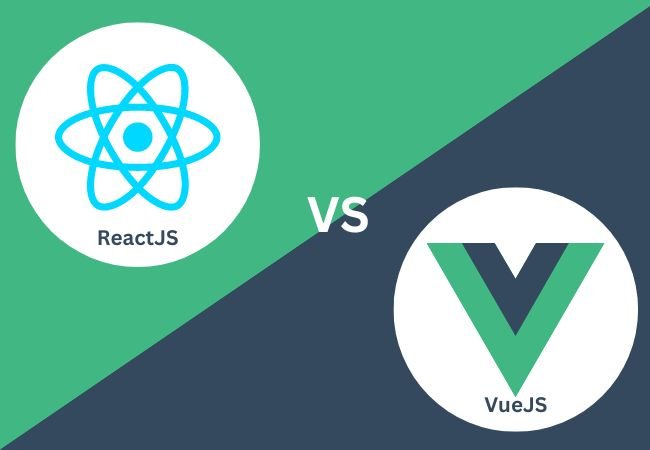ReactJS vs VueJS: Which JavaScript framework should you choose? Compare the pros and cons of each to find the one that suits your project. Discover the performance, scalability, ease of use, and community support of ReactJS and VueJS.
Choosing a front-end framework for your web development project can be a daunting task. With so many options available, it’s hard to know which one to choose. Two of the most popular choices today are ReactJS and Vue.js. In this article, we’ll explore the similarities and differences between these two frameworks and help you decide which one is better for your next project.
Contents
What is ReactJS?
ReactJS is a JavaScript library for building user interfaces. It was developed by Facebook and is now an open-source project with a large community of contributors. ReactJS uses a component-based approach to building UIs, which makes it easy to create reusable and modular code.
What is Vue.js?

Similarities between ReactJS and Vue.js
Component-based architecture – Both ReactJS and Vue.js use a component-based architecture, which allows for reusable and modular code.
Virtual DOM – ReactJS and Vue.js both use a virtual DOM to improve performance and efficiency.
Large communities – Both frameworks have large and active communities of developers, which means there are plenty of resources and support available.
Differences ReactJS vs VueJS
Learning curve – While both frameworks are relatively easy to learn, Vue.js is considered more beginner-friendly due to its simpler syntax and structure.
Performance – ReactJS is known for its excellent performance, especially when it comes to rendering large and complex UIs. Vue.js also performs well but may not be as fast as ReactJS in some scenarios.
One example scenario where ReactJS may be faster than Vue.js is when dealing with a large number of components that are frequently updated. ReactJS uses a technique called “reconciliation” to efficiently update only the parts of the DOM that have changed, while Vue.js needs to re-render the entire component tree each time a change is made.
This can make ReactJS faster than Vue.js in certain scenarios where frequent updates are being made to large and complex UIs. However, it’s important to note that Vue.js has made significant improvements to its performance in recent years and may perform just as well or better than ReactJS in other scenarios. Ultimately, the choice between ReactJS and Vue.js should depend on the specific requirements and constraints of your project.
Popularity – ReactJS has a larger community and is more widely used in industry, which means there are more job opportunities and resources available for developers. Vue.js, on the other hand, is growing rapidly in popularity and has a strong following among developers.
Ecosystem – ReactJS has a more robust ecosystem, with a wide range of tools, libraries, and frameworks available. Vue.js has a smaller ecosystem but is known for its simplicity and ease of use.
State management – ReactJS relies on third-party libraries like Redux or MobX for state management, while Vue.js has a built-in state management system called Vuex. This makes state management simpler and more intuitive in Vue.js.
Templating – Vue.js uses templates to define its UI, while ReactJS uses JSX, which is a syntax extension that allows you to write HTML-like code within JavaScript. Templates in Vue.js can make it easier to write and understand UI code, while JSX in ReactJS can provide more flexibility and control.
Component architecture – Both ReactJS and Vue.js use a component-based architecture, but there are some differences in how they handle components. ReactJS allows you to define components as either classes or functions, while Vue.js uses a template-based syntax to define components. ReactJS also provides more control over the life cycle of components, while Vue.js has a simpler and more streamlined lifecycle API.
Which one is better for your next project?
Choosing between ReactJS and Vue.js ultimately comes down to your project requirements and personal preferences. If you’re looking for a framework with excellent performance and a wide range of tools and resources, ReactJS is a great choice. If you’re a beginner or looking for a more straightforward and easy-to-use framework, Vue.js may be a better fit.
Conclusion
ReactJS and Vue.js are both excellent front-end frameworks with their own unique strengths and weaknesses. Choosing the right one for your next project depends on your specific requirements and preferences. We hope this article has helped you make a more informed decision and we wish you the best of luck in your front-end development endeavors!





0 Comments